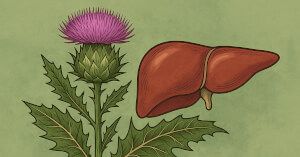
Milk Thistle
Milk Thistle is an herb used to support liver detoxification and protect against liver damage.
Milk Thistle (Silybum marianum) is a flowering herb traditionally used for liver health and detoxification. Its use dates back to ancient Greek and Roman times for supporting digestive and hepatic function.
The key active compound, silymarin, is a group of flavonolignans believed to have antioxidant, anti-inflammatory, and liver-protective properties. Milk thistle is commonly taken in capsule or extract form.
It is widely used to support liver health, particularly in cases of toxin exposure or liver stress. While promising data exists, especially for silymarin, more standardized clinical trials are needed to confirm its full benefits.
Other names & forms of Milk Thistle supplement : milk thistle (silymarin), silybum marianum, milk thistle, silymarin extract, milk thistle seed
Possible Benefits
The benefits of Milk Thistle include liver protection, antioxidant support, and healthy aging potential:
- Supports Liver Support by enhancing detoxification and promoting regeneration of liver cells
- Helps protect the body against oxidative damage, contributing to Anti-Aging
- May help maintain healthy blood sugar levels, relevant to Blood Sugar Support
- Contributes to General Health through its anti-inflammatory properties
Side Effects
Milk Thistle helps protect liver cells, but some users notice mild effects as detoxification ramps up. Watch for:
- Mild gastrointestinal discomfort, nausea or diarrhea, especially when first starting
- Possible headache or dizziness in sensitive individuals
- Occasional skin rash or mild itching in those with herb allergies
- Temporary mild laxative effect causing loose stools
- Rare changes in blood sugar levels, monitor if diabetic
Interactions
Potential interactions include:
- Hepatically metabolized drugs: Milk Thistle’s silymarin may inhibit CYP450 enzymes, affecting levels of medications such as statins or CoQ10; monitor blood levels and liver function tests.
- Anticoagulant and antiplatelet agents: Milk Thistle can enhance the effects of warfarin or supplements like Garlic, increasing bleeding risk.
- Diabetes drugs: Silymarin may improve insulin sensitivity; when combined with insulin or Cinnamon, watch for hypoglycemia.
- Hormone therapies: Some evidence suggests Milk Thistle might affect estrogen metabolism; if you are on Progesterone or HRT, discuss with your doctor.
Precautions
Before adding Milk Thistle, confirm you don’t fit any of these higher-risk categories. If you do, seek professional guidance:
- Pregnant or breastfeeding women: Limited safety data; use under medical supervision
- Individuals with hormone-dependent cancers: May have mild estrogenic effects; discuss with an oncologist
- People on anti-diabetic medications: May alter blood sugar; monitor levels closely
- Those with allergies to Asteraceae family plants: Risk of allergic reaction; avoid if sensitive
- Patients scheduled for surgery: Potential interaction with anesthesia; discontinue at least two weeks prior
Studies
These studies provide scientific insights into Milk Thistle benefits:
A 2017 meta-analysis of 24 RCTs found that silymarin at 420-600 mg/day significantly reduces ALT and AST in patients with chronic liver disease.
A 2018 randomized trial in 80 non-alcoholic fatty liver disease patients showed 140 mg silymarin three times daily for 12 months improved liver steatosis on ultrasound and reduced fibrosis markers versus placebo.
A 2012 double-blind RCT in 100 patients undergoing chemotherapy reported that 420 mg/day silymarin for 8 weeks did not significantly alter chemotherapy-induced hepatotoxicity rates , despite reduced symptom scores.
A 2016 crossover study in 30 healthy volunteers found no effect of a single 200 mg dose of silymarin on fasting glucose or lipid profiles versus placebo , indicating limited metabolic impact.
Disclaimer: This page is for educational purposes and does not replace medical advice. If you're pregnant, have a condition, or take medication, speak with a qualified professional.








